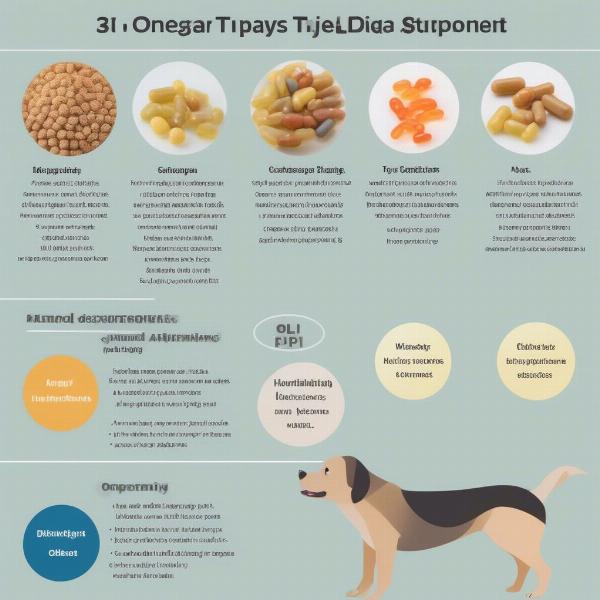Omega 3 oil for dogs has become increasingly popular amongst pet owners, and for good reason. These essential fatty acids offer a wealth of benefits, supporting everything from shiny coats and healthy skin to joint function and cognitive health. This guide will explore the numerous advantages of omega 3s, how to choose the right supplement, and address common questions surrounding their use.
Understanding the Benefits of Omega 3 Oil for Dogs
Omega 3 fatty acids are essential nutrients, meaning dogs can’t produce them on their own and must obtain them through their diet. These fatty acids, primarily EPA (eicosapentaenoic acid) and DHA (docosahexaenoic acid), play a vital role in numerous bodily functions. They are renowned for their anti-inflammatory properties, which can help manage conditions like arthritis and allergies. Additionally, omega 3s contribute to healthy skin and a glossy coat, often reducing itching and shedding. Beyond these visible benefits, they also support brain development in puppies and cognitive function in senior dogs.
Choosing the Right Omega 3 Supplement for Your Dog
Not all omega 3 supplements are created equal. When selecting a product, look for those sourced from fish oil, specifically from cold-water fish like salmon, mackerel, or anchovies. These sources are rich in EPA and DHA, the most beneficial forms of omega 3s. Check the label for the concentration of EPA and DHA per serving. Avoid supplements with added fillers or artificial ingredients. Also, consider the form of the supplement: oil, capsules, or chews. Choose the form that’s easiest to administer to your dog.
 Choosing the Right Omega 3 Supplement
Choosing the Right Omega 3 Supplement
How Much Omega 3 Should You Give Your Dog?
The optimal dosage of omega 3 oil for dogs depends on factors like size, age, and overall health. Always consult your veterinarian before starting your dog on any new supplement. They can recommend the appropriate dosage based on your dog’s individual needs. Starting with a lower dose and gradually increasing it is generally recommended to minimize potential digestive upset.
Omega 3s and Dog Food: What You Need to Know
Many commercial dog foods now include added omega 3 fatty acids. However, the amount and quality of these added fatty acids can vary significantly. Even if your dog’s food contains omega 3s, supplementing can still be beneficial, especially if your dog has specific health concerns like skin allergies or joint pain.
Potential Side Effects of Omega 3 Oil in Dogs
While omega 3s are generally safe for dogs, some potential side effects can occur, especially with high doses. These can include digestive issues like diarrhea or vomiting, fishy breath, and increased bleeding time. If you notice any adverse reactions, discontinue use and consult your veterinarian.
Conclusion
Omega 3 oil offers a wealth of benefits for dogs, supporting their overall health and well-being. From shiny coats and healthy skin to improved joint function and cognitive health, these essential fatty acids are a valuable addition to any dog’s diet. By choosing a high-quality supplement and consulting with your veterinarian, you can ensure your dog receives the optimal amount of omega 3s for their individual needs.
FAQ
- Can I give my dog human omega 3 supplements? While technically possible, it’s best to use supplements specifically formulated for dogs to ensure proper dosage and avoid potential toxins.
- How long does it take to see results from omega 3 oil? You may notice improvements in your dog’s coat and skin within a few weeks, while other benefits, such as joint health improvements, might take several months.
- What’s the best way to store omega 3 oil? Store omega 3 supplements in a cool, dark place to prevent oxidation and maintain their effectiveness.
- Are there any interactions between omega 3 oil and other medications? Consult your veterinarian about potential interactions if your dog is taking other medications, especially blood thinners.
- Can puppies take omega 3 oil? Yes, omega 3s are beneficial for puppies’ brain development and overall growth. Consult your veterinarian for the correct dosage.
- Is omega 3 oil good for senior dogs? Absolutely! Omega 3s can support cognitive function and joint health in older dogs.
- What are some signs of omega 3 deficiency in dogs? Signs can include dry, flaky skin, dull coat, excessive shedding, and joint stiffness.
ILM Dog is a leading international online resource dedicated to providing expert advice on dog care and wellbeing. From breed selection and puppy care to senior dog health and training, ILM Dog covers all aspects of responsible dog ownership. We are passionate about helping dog lovers around the world provide the best possible care for their furry companions. For personalized guidance and expert advice, contact us at [email protected] or +44 20-3965-8624. For more valuable resources and product recommendations, visit ILM Dog.